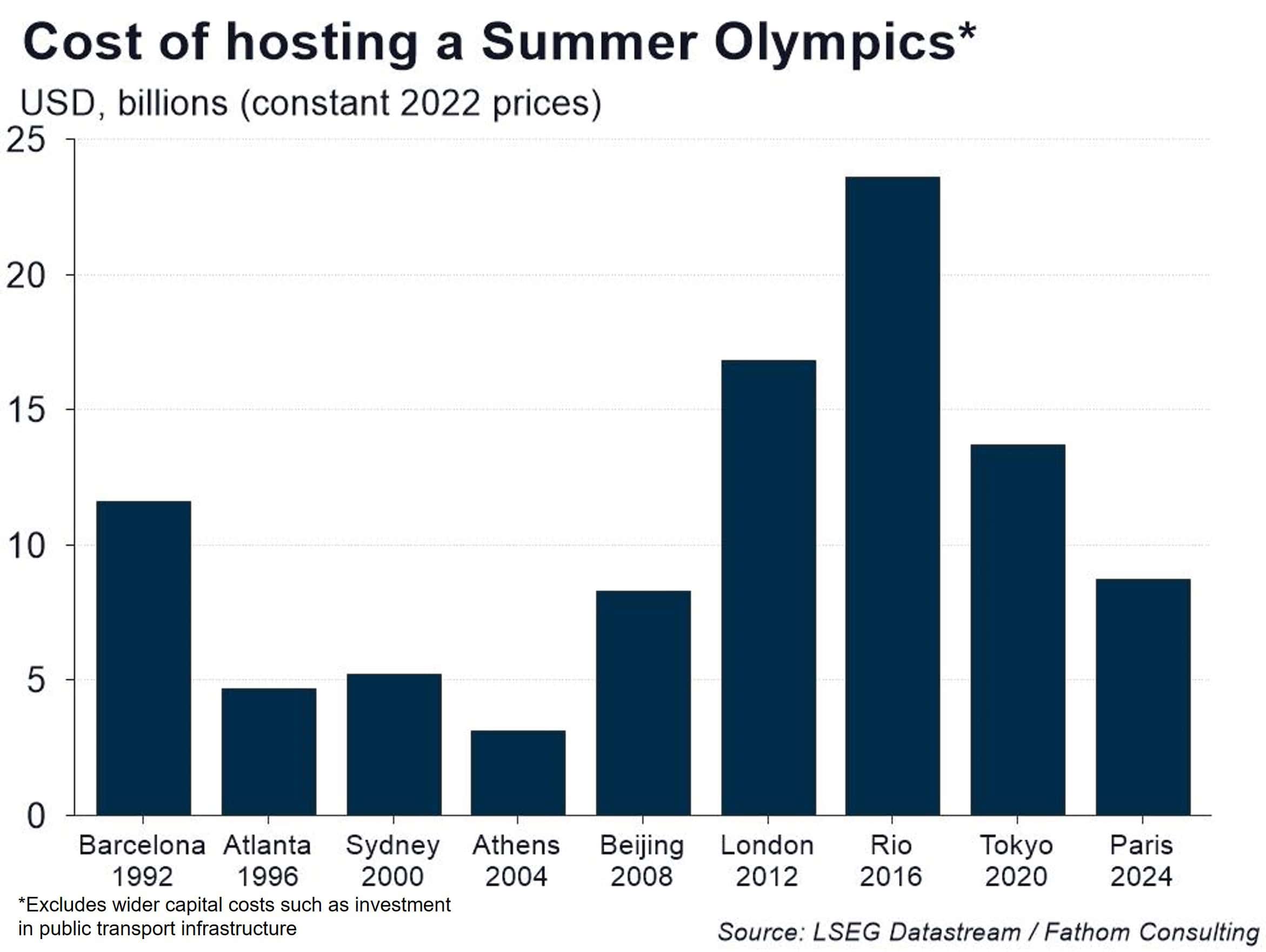A sideways look at economics
The streets of Paris appeared to be free from locals last week. That’s not necessarily unusual in August. The French are famous for enjoying Les Grandes Vacances with extended trips out of the city. But this year, there was the added factor of the Olympics: with concerns about expensive ticket prices, packed transport and even safety, around half of Parisians in one poll said they would leave the city as the famous flame arrived. However, as the competition got under way, newspapers were reporting that people were cutting their holidays short to return home. Not only had their pre-games fears failed to materialise, but they were in with a chance of catching Snoop Dogg watching dressage. Moreover, Team France was on track for a record medal haul — something predicted by my colleague’s blog in May.
Hosting a Summer Olympics is not cheap: the bill runs into the billions of dollars, as large-capacity venues are required for relatively obscure sports. There is also the cost of hosting thousands of athletes and ensuring that the millions of attendees are able to get around safely and with relative ease. What’s worse, estimated costs tend to be wildly understated. And although revenues for the Olympics are large, the International Olympic Committee likes to keep a good chunk of them for themselves. The received wisdom is therefore that the costs of hosting a Summer Olympics are not worth the benefits. To the extent that jobs are created, these are temporary and displace others. The same thing is true for visiting guests. At times, it felt like the only tourists in Paris were there to watch sports, with the usual summer throng opting to go elsewhere. Musée de l’Orangerie said it recorded 31% fewer visitors than usual during the games, offering the opportunity to enjoy Monet’s water lilies in relative peace.

Before the games had started, it seemed that the French public had digested this academic consensus, often egged on by a press that revels in bad rather than good news. I recall the negativity ahead of London 2012, when many were planning a trip out of town to avoid potential chaos and crowds. This type of glass-half-empty attitude was echoed in French polls, where only 65% of those surveyed felt that hosting the games would be a good thing. Support was even lower among residents in the Paris region, coming in at 56%. Prime concerns were transportation (83%), security (73%), and that things wouldn’t be ready in time (71%).
And yet, by the end of the games just 11% of those surveyed by Ipsos had a negative overall opinion of Paris 2024. It seems to me that ahead of these large events there is a form of collective anxiety, as we focus on the negatives rather than the positives. This can happen at a personal level before a large gathering. It’s normal to be a little anxious, but if we’re not careful we risk becoming problems-focused rather than solutions-focused. The negatives in the form of cost are direct and easily measured. Meanwhile, the benefits in terms of feelgood factor that come from moments of shared joy — whether that is in our social circles or for the country at large — are intangible and uncertain. They do exist, however. After a divisive pre-games election, there’s little doubt that fans of both LePen and Mélenchon were celebrating as Léon Marchand tapped home to win his fourth gold.
It’s right that governments continue to focus relentlessly on fiscal discipline. We are in an era of stretched public finances, after all. But they should equally forensic about possible benefits: we are in an era of anaemic productivity growth, after all. Part of the problem in the UK appears to be HM Treasury, a department which has a reputation for an excessively rigid approach to cost-benefit analysis. But it’s also fair to blame our electoral system, which prioritises smaller but more rapid payoffs over larger ones that take longer to materialise. The public is not innocent either. Too often, a vocal minority of negative NIMBYs are able to oppose worthwhile projects. Overcoming these structural headwinds won’t be easy. But the payoff would be worth it.
A final piece of advice to those making these spending decisions: focus on long-term growth, mostly, but be sure to allocate some of the money to things that improve wellbeing in the broadest sense of the term. Sadiq Khan has come out in favour of London hosting a record fourth Summer games in 2040. To anyone at HMT reading this, please don’t rain on the parade. A lot of the infrastructure to host already exists, and Paris shows that building temporary structures saves on cost. And in any case, there’s more to life than GDP.